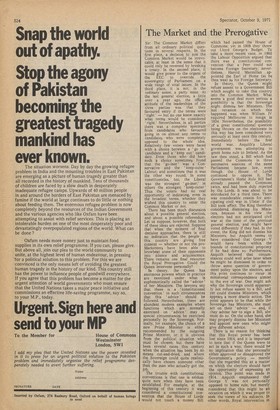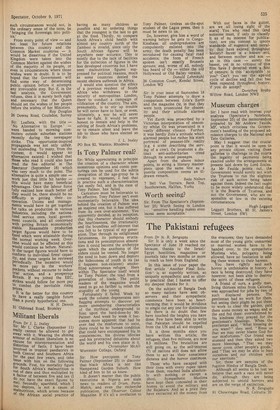The Market and the Prerogative
Sir: The Common Market differs from all ordinary political questions in several respects. In the first place, a decision to join the Common Market would be irrevocable, at least in the sense that it could only be reversed by breaking a treaty. In the second place, it would give power to the organs of the EEC to override the sovereignty of Parliament on a wide range of vital issues. In the third place, it is not, in the ordinary sense, a party issue. At the last general election, a little over a year ago, the official attitude of the leaderships of the three parties was that they favoured entry if the terms were '
right' — but no one knew exactly what terms would be considered ' right.' Nevertheless, in all parties there was a complete spectrum from candidates who favoured going in on almost any terms to candidates who were completely opposed to the whole idea. Relatively few voters were faced with a choice between a 'go in' candidate and a 'keep out' candidate. Even those who did have such a choice sometimes found that the ' go-iner ' was a Conservative and the ' keep-outer ' Labour, and sometimes that it was the other way round. In some constituencies, too, the Liberal was the strongest ' go-iner,' in others the strongest ' keep-outer ' Thus the voters had no real opportunity of indicating, even in the broadest terms, whether they wished this country to enter the Common Market or not.
There has been much discussion about a possible general election, and about a possible referendum. Let us suppose, however, that both of these ideas are rejected. Suppose that when the moment of final decision approaches, there is still no indication that the people of this country are giving free consent — whether or not the proMarketeers have been able to browbeat some of their opponents into silence and acquiescence. There remains one final resource: the Royal Prerogative. Could the Queen intervene personally?
In theory, the Queen has enormous powers which in practice are exercised under what is euphemistically called the ' advice ' of her Ministers. The lawyers say that there is a ' constitutional convention ' in such circumstances that this ' advice ' should be followed. Nevertheless, there are abundant modern examples where functions which are normally exercised on 'advice ' may in special circumstances be exercised personally by the Sovereign. Normally, for example, the choice of a new Prime Minister is either recommended by the outgoing Prime Minister, or it is obvious from the political situation who must be chosen; but there have been several cases this century when the situation has been by no means cut-and-dried, and where the Sovereign could quite realistically have chosen someone other than the man who actually got the job.
The trouble with constitutional conventions is that one is seldom quite sure when they have been established. For example, at the beginning of this century it was considered a constitutional convention that the House of Lords would not touch a money Bill which had passed the House of Commons; yet in 1909 they threw out Lloyd George's Budget. To take a more recent case, in 1960 the Labour Opposition argued that there was a constitutional convention that a Peer could not become Foreign Secretary; nevertheless, Harold Macmillan appointed the Earl of Home (as he then was) as his Foreign Secretary.
In theory, the Queen might refuse assent to a Government Bill which sought to take this country into the Common Market. What seems a good deal more serious a possibility is that the Sovereign might dismiss her Ministers. The last occasion on which this happened was when William IV required Melbourne to resign in 1834. Nevertheless, the possibility of a great constitutional question being thrown on the electorate in this way has been considered very seriously at least once this century. Immediately before the first world war, Asquith's Liberal government was attempting to grant home rule to Ireland. As the law then stood, a Bill which had passed the Commons in three successive sessions of the same Parliament became law, even though the House of Lords continued to oppose it. The Government's Home Rule Bill had already passed the Commons twice, and had been duly rejected by the Lords. It was about to be introduced for a third time. There was considerable reason for anticipating civil war in Ulster if the Bill took effect. The King therefore considered dismissing his Ministers, because in his view the electors had not anticipated civil war at the time of the previous general election, and might have voted differently if they had. In the event, the King did not dismiss his Ministers, but Asquith seems to have considered that George V would have been within the bounds of constitutional propriety if he had done so. Furthermore, Asquith believed that circumstances could well arise later when he might be dismissed in order to throw some question of government policy upon the electors, and this point continues to recur in ministerial correspondence almost to the eve of war. One might ask why the Sovereign could apparently not refuse assent to a Bill, and yet could dismiss Ministers, which appears a more drastic action. The point appears to be that while the Sovereign has Ministers, she must act on their ' advice ' — and, if they advise her to sign a Bill, she must do so. On the other hand, she may properly dismiss her Ministers and appoint new ones who might give different advice.
There is no reason for thinking that this Royal power has been lost since 1914, and it is important to note that if the Queen were to act in such a way, there would h0 no implication that she personally either approved or disapproved the Government's policy — merely that she regarded this as a matter on which the electors should have the opportunity of expressing an opinion. This point was made in 1914. Asquith emphasised that George V was not personally opposed to home rule, but merely considered that this might be an occasion on which it was proper to seek the views of his subjects. In other words, Royal intervention in such circumstances would not, in the ordinary sense of the term, be 'bringing the Sovereign into politics.'
From every point of view — and not least for future relations between this country and the Common Market countries — it Would be disastrous if the United Kingdom were taken into the Common Market against the wishes of the majority of its people, or even in circumstances where those Wishes were in doubt. It is to be hoped that the Government will find some way of determining Public opinion before it attempts any irrevocable step. But if, in the last analysis, the Government refuses, then it is surely both right and necessary that the Queen Should set the wishes of her people before the wishes of her Ministers.
Roy Douglas 26 Downs Road, Coulsdon, Surrey
Sir: Leaflets, with the title — ' No Alternative to Europe' — were handed to morning commuters outside suburban stations recently during the newspaper strike. This opportunist-inspired Propaganda was not only unfair, but misleading. To many, from the context, it would appear no alternative existed. I wished that those who read it could also have read the fine editorial in The Spectator (September 18) which was very much to the point. The alternative is quite a simple one — Work just that little bit harder — this would have many beneficial advantages. Once the labour force fully realized how much better off they would be, there should be no difficulty in getting their cooperation. Unions and managements would have to get together for talks on production in various Industries, including the nationalized service ones, local government councils, and all concerned With getting Britain economically stable. Reasonable production target figures would have to be fixed which were attainable during the normal working week. Overtime would not be affected as this would continue as before. Naturally the target figures would have to conform to individual firms' capacity, and these targets be reviewed Periodically. The incentive would be more pay in the workers' Pockets, without recourse to industrial action, and a prosperous Britain. If we joined the EEC, strikes would follow for more pay to combat the inevitable rising Prices.
It is far better for this country to have a really tangible future than a purely hypothetical one.
H. H. Dennis
31 Oldstead Road, Bromley











































 Previous page
Previous page